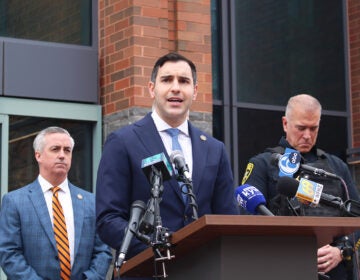Judge rules in favor of Bucks County sheriff who signed agreement with ICE to help with immigration enforcement duties
The court found the plaintiffs were not harmed by an agreement not yet in effect and Sheriff Fred Harran did not need approval from county commissioners.

An Immigration and Customs Enforcement officer is seen from behind. (AP Photo/Gregory Bull, File)
From Delco to Chesco and Montco to Bucks, what about life in Philly’s suburbs do you want WHYY News to cover? Let us know!
A Bucks County judge upheld Sheriff Fred Harran’s decision to partner with U.S. Immigration and Customs Enforcement, rejecting a legal challenge that sought to block the controversial 287(g) agreement.
The ruling, issued Tuesday by Judge Jeffrey G. Trauger of the Bucks County Court of Common Pleas, allows the sheriff’s office to proceed with the ICE cooperation agreement — at least for now — despite opposition from county commissioners, immigrant rights advocates and the American Civil Liberties Union of Pennsylvania.
The decision comes as Harran, a Republican, seeks reelection as he fends off a challenge by Democratic challenger Danny Ceisler.
Harran released a statement shortly after the decision, calling it “a victory for the law-abiding residents of Bucks County and a validation of a common-sense approach to public safety which fully leverages partnerships and resources to keep our communities safe.”
“This decision affirms our ability to use this simple tool to ensure individuals who commit crimes in our county are held fully accountable – regardless of their immigration status,” he wrote.
Stephen Loney, senior supervising attorney at the ACLU, said the “fight is far from over.”
“It’s unfortunate that the judge in this case failed to appreciate what the law clearly states; the sheriff does not have authority to sign onto a 287(g) agreement with ICE,” Loney said in a statement. “We will appeal this decision and, in the meantime, we will continue to work to hold Sheriff Harran accountable to the rule of law.”
Harran signed the 287(g) “task force” model agreement with ICE in April. Under that model, trained local deputies may act in a limited immigration enforcement capacity, including serving ICE warrants and checking individuals in custody against ICE databases.
That led to a series of protests by local activists and contentious court proceedings.
No standing
The lawsuit, filed in June, argued that Sheriff Harran lacked legal authority to enter into a 287(g) agreement without approval from the county’s Board of Commissioners. Plaintiffs, including Make the Road, NAACP Bucks County, Buxmont Unitarian Universalist Fellowship and Juan Navia, a Bucks County resident who claimed the arrangement violated Pennsylvania law and posed risks to civil rights and public trust.
However, in the 13-page decision, Judge Trauger found that the plaintiffs lacked standing to pursue the case at this stage because of a lack of harm from an agreement that is not yet in effect.
“Plaintiffs here are alleging injuries that are not immediate or substantial,” Trauger wrote. “Rather, in their complaint, they allege what are clearly only speculative future injuries based on speculative future events.”
The decision singled out Navia, who was asked to join the plaintiffs and argued in court that he and his family feared they would be subjected to an increase in racial profiling. During cross-examination, Navia said he did not know of anyone who was already affected.
Trauger wrote that Navia “baldly alleges that he is at an increased risk of profiling” but “alleges wholly subjective fears of possible future incidents, including racial profiling, warrantless searches and arrests.”
As a result, the judge said, “none of the Plaintiffs have proper standing to bring this action.”
On whose authority?
Trauger’s decision did find that the Bucks County Board of Commissioners had standing to pursue their challenge. In May, the board passed a resolution reaffirming its sole contractual authority and declaring the 287(g) agreement invalid, citing concerns about liability costs. Commissioners Diane Ellis‑Marseglia and Bob Harvie supported the resolution; Commissioner Gene DiGirolamo dissented, voicing confidence in Harran’s approach.
The commissioners separately challenged Harran’s agreement with ICE, arguing that Harran was legally required under state law to seek approval from the county commissioners before entering into binding agreements on behalf of the county and that the sheriff cannot unilaterally bind the county to a federal partnership.
However, the judge disagreed, finding that “the documents signed by the Sheriff are not an enforceable contract and therefore were not subject to the approval” of the commissioners.
He also cited earlier agreements with federal agencies that the sheriff entered into without objection, such as those with the U.S. Marshals and ICE Homeland Security Investigations, which “did not include or require any County Commissioner approval.”
The decision also notes that Harran signed the memorandum of understanding with “limited intent,” designating only three officers to take on the outlined duties and keeping those duties limited.
What’s next?
Critics warn that the 287(g) task force model has a history of racial profiling, overreach and misuse in other jurisdictions. They argue that immigrant victims of crime may be less willing to report crimes or cooperate with law enforcement if local deputies are seen as ICE proxies.
However, Harran has emphasized that the agreement would be targeted, not sweeping. He said the program will only involve those already in custody on criminal or warrant charges and not routine traffic stops, and that he is not seeking to deputize deputies to police immigration status generally.
He has also asserted that the program would come at zero cost to county taxpayers, with ICE reimbursing equipment, vehicles and personnel expenses, though commissioners and others have expressed concern over potential liability costs borne by the county if a raid or arrest goes wrong.
The debate intersects directly with the race for sheriff, between Harran and Ceisler, the Democrat.
Ceisler has been critical of Harran’s ICE collaboration, arguing that it diverts resources, reduces trust and harms public safety. He contends that deputies should focus on county law enforcement duties rather than carrying out federal immigration tasks.

Get daily updates from WHYY News!
WHYY is your source for fact-based, in-depth journalism and information. As a nonprofit organization, we rely on financial support from readers like you. Please give today.







